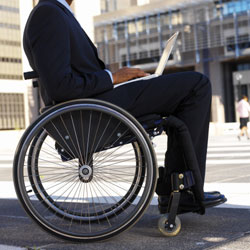 |

Guidelines: Making Health Settings &
Information Accessible
The Disability and Health Team
supports the development of guidelines for making
Emergency
Preparedness | Fitness and Recreation |
Primary Care | Health Communication
| Conferences/Meetings more accessible to
people with disabilities. Tools/Checklists and other
Weblinks are provided below.
Accessible is a term
that describes the usability of a product or service by people with
disabilities.
Universal Design is
a term that describes the designing products and environments that
everyone can use regardless of body dimension, age, or disability
status. Employing universal design from the onset prevents the need
to retrofit environments and in most cases eases confined spaces and
makes objects easier to interact with for everyone. This type of
design and construct requires some consideration. For guidance on
accessible and universal designs, please contact the:
| (DISCLAIMER: Views and opinions expressed in this publication are not
necessarily those of CDC, the Department of Health and Human Services (HHS),
or the U.S. Public Health Service (PHS).) |
| Determining Accessibility:
Tools/Checklists |
[Return
to Top]
| Weblinks to All Inclusive
Guidelines |
[Return
to Top]
| Guidelines for Emergency
Preparedness |
[Return
to Top]
|
Guidelines for Recreation and Fitness Facilities |
-
National Toy Adaptation Network: With the support of the
Mitsubishi Electric America Foundation, Allied Services in
Scranton/Wilkes-Barre Pennsylvania established the National Toy
Adaptation Network. The Network members provide specialty
services in adapting toys for kids with disabilities.
Technicians work with parents and therapists to customize toys:
adding extended control handles, seat lift devices, velcro
safety straps, specialized controls, whatever it takes to make
that toy safe and enjoyable for the child - all done for free.
For a contact in your area or more information, please click on
the link or call 1-888-FIX-A-TOY or Allied Services at
717.348.1300.
-
National Lekotek Center in
Chicago, IL is a non-profit organization with a national network
of 50 affiliates that promote access to play for children with
special needs, and access to supportive services for their
families. For more information on toys, play and technology for
children with disabilities, please click on the link or call the
Lekotek Toy Resource Helpline at 800-366-PLAY.
-
Toys R US Toy
Guide for Differently-Abled Kids: In partnership with
Toys R US, the National Lekotech Center, evaluates and selects
toys to be included in the Toys R US Guide for Differently-Abled
Kids. Click on the link to obtain a copy of the guide.
-
Guide
to Toys 2005: Let's Play, A Guide to Toys for Children with
Special Needs
-
Recreation A Great Way to Be Active:
A Guide to Getting Started
For people with Disabilities.
-
Removing Barriers to Health Clubs and Fitness Facilities.
(1999)
-
Access Board ADA Guidelines for Recreation Facilities. (2002)
-
Access Board Guidelines on Play Areas (2005)
[Return
to Top]
| Guidelines
for Health Care Providers and Facilities |
-
For guidelines for communicating about health care, click on
http://www.idph.state.ia.us/bh/disability_prevention.asp and
select Communicating About Health Care with People who have
Disabilities.
-
Removing Barriers to Health Care: A Guide for Health Professionals
(1998)
-
Medical Offices Access
Equals Opportunity: Your Guide to the Americans with Disabilities Act
(1992) For a copy, contact the Council of Better Business
Bureaus' Foundation in Arlington, Virginia 703.247.3656 or the Region 4
Resource Center 1.800.949.4232.
-
Oral Health
-
Oral Health Care
For People With Special Needs: Guidelines for
Comprehensive Care A culmination of the multi-part series that can
be found in the Exceptional Parent Magazine published in 2003. A 47
page monograph that provides a comprehensive Introduction; Behavior
Management Techniques; Special Diagnostic and Treatment
Considerations concluding with Professional Challenges and
Responsibilities and References for further reading. Co-edited by
Sanford J. Fenton, DDS, MDS; Steven Perlman, DDS, MScD and Harold
Turner, AB, DDS.
-
Women's Health Care
-
Assistive Technology
-
Schwartzberg, J.G., Kakavas, V.K., & Malkind, S.
(Eds.) 1996. Guidelines for the Use of Assistive Technology:
Evaluation, Referral, Prescription, 2nd edition. Chicago, IL:
Department of Geriatric Health, American Medical Association. To
order copies, call 312/464-5085.
http://www.ama-assn.org/ama1/pub/upload/mm/433/assistivetechnology.pdf
[Return
to Top]
| Guidelines
for Health Communication Venues |
[Return
to Top]
| Guidelines
for Health Meetings and Conferences |
-
Removing Barriers: Planning Meetings that are
Accessible to all Participants. This North Carolina publication highlights guidelines
and strategies to help organizations make their meetings accessible and
welcoming to people with disabilities. The guide focuses on small and
last-minute meetings to make sure that a variety of participants are
included in all aspects of organizational life. [PDF]
-
The Guide: National Association of State Directors of
Developmental disabilities Handbook on inclusive Meetings and
Presentations (2006).
http://www.nasddds.org/pdf/TheGuide.pdf.
-
U.S. Department of Education: Policy Statement on Meeting Accessibility
for Individuals with Disabilities
-
Planning Accessible Meetings: Part III - Making Your Presentations and Materials
Accessible AXIS Center for Public Awareness of People with
Disabilities is an organization in Ohio. This webpage is a part of a
series of articles. This article focuses on how to set up meeting rooms to
accommodate everyone, prepare speakers to present information in a way that
everyone can understand, and ensure all conference materials are offered in
alternate formats.
- See Through Barriers: Making Conferences & Events Accessible to People Who
Are Blind (2000) Developed by the Canadian Abilities Foundation,
this guide focuses on meeting
access for people who have vision loss. Topics covered
include meeting announcements, facilities, registration, starting the
event, chairing the event, presenters, luncheons and receptions, and
exhibits and displays.
- Involving
People with Disabilities as Members of Advisory Groups: Rural
Practice Guidelines.
http://rtc.ruralinstitute.umt.edu/advocacy/Advisory.htm
[Return
to Top]
Date: June 20, 2006
Content source: National Center on Birth Defects and Developmental
Disabilities
|
 |
|